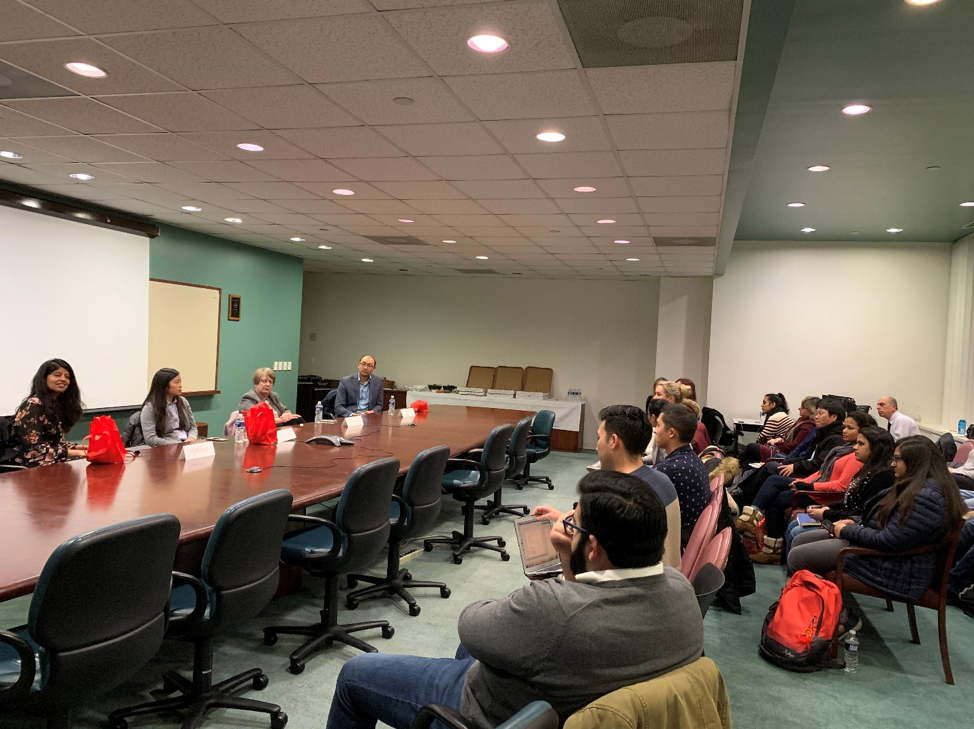An event where you receive great pharmaceutical industry career advice, a colloquium credit, and pizza is surely a win, win, win by all measures! The Pharmaceutical Industry Career Panel event held on Thursday, December 5, 2019, featured four panelists, three of whom were recent MBS program graduates (extra win!), and was moderated seamlessly by Abbe Rosenthal, the Rutgers MBS assistant director, executive coach, and head of corporate partnerships, student employment, alumni engagement & professional development.
First, a bit about the panelists:
- Stephanie Yang, MBS’17 - Business Operations Analyst, Integrated Oncology at Bristol-Myers Squibb; MBS concentration in Drug Discovery and Development
- Donna R. Vickery, MD, ABFM, MBS’15 - Clinical Trial Lead, Oncology Clinical Development at Bristol-Myers Squibb; MBS concentration in Drug Discovery and Development
- Derek Hok, MBS’15 - Strategic Partner Manager, R&D External Manufacturing at Bristol-Myers Squibb; MBS concentration in Drug Discovery and Development
- Ayesha Sitlani, Ph.D. - Associate Vice President, Antibody Strategy at International AIDS Vaccine Initiative (IAVI), with an impressive career in industry of approximately 20 years at Merck
The event was full of current MBS students who took advantage of these seasoned industry professionals’ knowledge and experience by asking direct questions about career growth and development strategies.

Panelists from Left to Right: Ayesha Sitlani, Stephanie Yang, Donna Vickery, and Derek Hok.
With 75 percent of the panelists holding MBS degrees, the main questions revolved around how Stephanie, Donna, and Derek successfully presented themselves as MBS degree holders to their hiring managers and what strategies they used to best present their experience. The overarching idea here was that an explanation of the degree needs to be presented succinctly and uniquely, and should be appropriately customized depending on the situation and audience (e.g., explaining the degree to a hiring manager during an interview versus explaining the degree to current employer for something like tuition reimbursement).

MBS students actively engaged in career conversations with the panelists.
Additional suggested strategies and ideas for explaining/presenting the MBS degree to employers and other individuals who are still unaware of it are as follows. The MBS degree is:
- An advanced degree that blends business knowledge with a science-specific curriculum
- An advanced degree that provides education for careers in business and industry as opposed to careers in academia (e.g. to obtain a Ph.D.)
- A degree with a broad view of the drug discovery and development career spectrum, from the nuts and bolts of research and development as well as insights into regulatory affairs, intellectual property, and commercialization
- A hybrid degree of advanced business and science training; a combination of an MS and an MBA
- A specialized business degree for the pharmaceutical industry
- An interdisciplinary degree that equips one to perform well in cross-functional teams within the pharmaceutical industry and allows one to comfortably wear multiple hats
- The importance and value of this point was also stressed by Dr. Beth Ann Murphy, the new life sciences coordinator for the PSM program who worked at Merck for 25 years as a scientist/director of in vivo pharmacology. She added that the foundation of the pharmaceutical industry lies in program teams where the need for transferable skills, collaboration, problem solving, and negotiation is imperative.
The alumni panelists also discussed the core MBS business courses within the Drug Discovery & Development concentration that have been most useful in their careers—particularly those centered around communications, negotiations, analytics, and business perspectives for scientists, such as:
- Principles of Communication and Professional Development (16:137:502)
- Principles of Accounting and Finance for Science and Technology (16:137:530)
- Market Assessment and Analysis for Business and Science (16:137:507)
- Fundamentals of Intellectual Property (16:137:501)
With regard to networking and interviewing, the panelists all agreed that making personal connections is highly valuable, and that it is not just about “who” you know but also about the “what, how, and why.”
When interviewing, it is important to have a lean, clean, and simple resume and to prepare for the interview by learning something about the interviewer (e.g., from his or her LinkedIn profile) in order to make a personal connection; it is important to show interest by asking about the job itself and what the interviewer likes about it (not just about vacation days, salary, and work-life balance). When communicating via e-mails, it is crucial to show good writing skills and critical to proofread.

Students taking note of suggested strategies for presenting / explaining the MBS degree from industry professionals who have been down that path.
Lastly, panelists advised students that career opportunities related to a candidate’s passion or interests, or those that may be productive for future growth, should definitely be explored—even if they may be a lateral career move or a step down from a current position at the time—as these opportunities are far more valuable in rounding out a professional career than just climbing the career ladder.